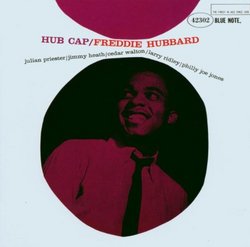| All Artists: Freddie Hubbard Title: Hub Cap Members Wishing: 1 Total Copies: 0 Label: Blue Note Records Release Date: 1/28/2003 Album Type: Original recording reissued, Original recording remastered Genres: Jazz, Pop Style: Number of Discs: 1 SwapaCD Credits: 1 UPCs: 724354230226, 0724354230257 |
Search - Freddie Hubbard :: Hub Cap
 | Freddie Hubbard Hub Cap Genres: Jazz, Pop
|
Larger Image |
CD Details |
CD ReviewsGolden "Hub Cap" Michael B. Richman | Portland, Maine USA | 02/15/2003 (5 out of 5 stars) "Freddie Hubbard's "Hub Cap" was originally released on CD domestically in the late 80s, and tragically and undeservedly deleted shortly thereafter by bean counters at Blue Note/Capitol. Well intelligent minds have finally prevailed because "Hub Cap" is back in print as part of the RVG series. Recorded in 1961 when Freddie's Jazz Messenger stint was just beginning, "Hub Cap" features a sextet just like Art's band did. On this recording it is Julian Priester on trombone and Jimmy Heath on tenor sax (both in rare Blue Note appearances), backed by the rhythm trio of Cedar Walton on piano, Larry Ridley on bass and Philly Joe Jones on drums. The standout tunes are the title track, Randy Weston's "Cry Me Not" and fellow-Messenger Walton's "Plexus," which will make an encore appearance on Blakey's "Three Blind Mice, Volume 1" (see my review of that title). With remastered sound, new liner notes, and rare Francis Wolff photos, "Hub Cap" is now more golden than ever." Freddie Hubbard, Hub Cap Chris Covais | 04/23/2005 (5 out of 5 stars) "When I bought this cd, the night before my 13th birthday, in the summer of 2003, I knew practically nothing about Freddie Hubbard's music, and his playing. I only had a couple of tracks with him playing trumpet on the Art Blakey Ken Burns disk. I mainly bought this disk for the appearence of drummer Philly Joe Jones. But now as I listen to this, like this morning on the way to classes, I pay attention to Hubbard's playing and the arrangements on this disk. This is hard bop, with taste, due to Philly Joe on drums. Complimenting Freddie's hard bop style is Jimmy Heath on tenor sax, Julian Priester on trombone, Cedar Walton on piano, Larry Ridley on bass, and of course Philly Joe Jones on drums. The arrangements are courtesy of Melba Liston, (who's trombone playing in Dizzy Gillespie's band was epivitol,) and Randy Weston, who penned the classic, "I Should Care." Note: These two do not play on the album. The album opens with the haunting, Hub Cap. These arrangements are way ahead of its time. These arrangements sound like arrangements from 1965 at the very least, and here they are, in 1961. This just goes to show how talented the arrangers are. The ballad, Cry Me Not. This is an interesting piece. Not a love ballad, by any means. Very progressive. This album is dark, complex, and revolutionary. The hip groove of "Luana" is up next. Philly Joe's backing behind Larry Ridley's bass solo, should be taken note of. Also, his solo is ever so creative. For a more straight ahead approach, the group grooves on the soulful strut of "Osie Mae." Philly just makes this piece swing! Probaly the top three Blue Note trumpet players of this time were Lee Morgan, Donald Byrd, and Freddie Hubbard. Though I wouldn't call Hubbard the greatest, (Lee Morgan recieves that roll, imo) he sure was talented. His talents are featured on the two remaining tracks, Plexus and Earmon Jr. The RVG edition features an alternate take of Plexus. It's easy to tell why this one was chosen not to be included as the master take. Philly's solo is choppy, and Freddie just goes back to the melody, clearly not letting Jones finish his solo, as it sounds he interupts him in the climax of his solo. This is a master album! It deserves more credit. It really features some nice playing and great arrangements. As I stare at the liner notes of this disk, I just think to myself, what a great album this is. If you haven't heard this cut, pick it up and give it your full attention. Freddie Hubbard, Hub Cap." The mean side of Freddie Hubbard earl rlabaci | 11/14/2005 (5 out of 5 stars) "The theme of this Hubbard album, besides intensity, is minor keys. The first track "Hub Cap" is a fast number which is in a minor key. It is a typical hardbop progression with an intense charged feeling. Phily Joe Jones somewhat takes the role of Art Blakey yet it seems that I have always been able to distinguish the two drummers styles.
"Cry me Not" is a great composition by the pianist/composer Randy Weston. Trombonist Melba Liston does a great job at arranging it, I'd say its one of the best ballad arrangments out there. Most of tunes are by Hubbard except for "Plexus" which Cedar Walton contributed and "Cry me not". Most of the material here is typical hardbop stuff. The fact that it is a sextet makes much more interesting than the usual quintet. The sound is bigger and more forceful plus you can harmonize the voices in different ways. Hubbard, Heath, and Walton solo in top notch form, Julian Priester isn't as much a soloist as he is a just a session player. "Open Sesame" was an excellent start for Hubbard yet I think he really used his composing and arranging skills more during this session. If you are into Blakey and the Messengers, Mingus, or Horace Silver, then you will dig this." |

 Track Listings (7) - Disc #1
Track Listings (7) - Disc #1